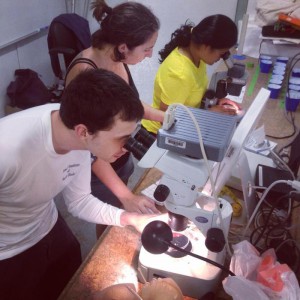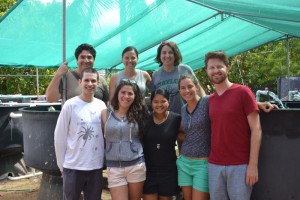
Conducting counts of coral egg bundles during coral spawning volunteer research at Coconut Island, Kaneohe Bay, Hawaii (Foreground: Robert Mason, 2013-2015, Australia; mid-ground: Jen Davidson; background: Jolly Ann Cruz)
Imagine sitting in a hall, surrounded by the brightest of your peers in the nation. You’re a senior high school student, and in front of you is a test paper – but it’s no normal test paper. The topic is not something anyone learns at school, nor even in most university courses. In fact, the topic is so specialized that only a small group of experts knows the material well. Fortunately, you work together with a teammate to answer the exam – and you need one, as your next exam is a magnetism problem that would tax a fully trained engineer.
This might sound like an X-men recruitment exam, but it’s the true experience of a small number of students from each American State participating in the National Science Olympiad, an annual competition in which students are tested on 22 different science and technology topics. Only one or a few schools per state qualify to take part in the contest. To help their students prepare, many schools enlist professors, scientists and other experts, who volunteer their time as coaches.
This year, I had the opportunity to coach the team at Iolani School, in Honolulu, which had qualified to represent Hawaii at the 2014 Olympiad. I have been studying at the Hawaii Institute of Marine Biology of the University of Hawaii at Manoa, where I am presently a Visiting Fulbright Student Researcher from Australia. I coached the Iolani Team on the topic of Water Quality, a field close to my heart as a trainee marine biologist. Other experts, including an entomologist and a comet expert, helped the Iolani students prepare for the many Olympiad test topics. The Olympiad itself was held in Orlando Florida, where Iolani School distinguished itself by becoming the first Hawaiian team to win a Gold medal in an Olympiad topic. Fitting, given the prominence of both the ocean and of geologic activity in Hawaii, that topic was Hydrogeology.

Group of volunteer coral spawning researchers at Coconut Island, Kaneohe Bay, Hawaii, who all stayed up very long nights to observe coral spawning, count coral eggs and collect data for coral conservation science (Bottom row, left: Robert Mason, 2013-2015, Australia)
Since arriving to the United States in February of 2013, I’ve also volunteered within the University of Hawaii at Manoa, helping scientists to run studies on coral spawning, the annual releases of sperm and eggs vital to coral reproduction. The investigations occurred at night and the early morning hours, to coincide with the release of gametes at new moon. Through assisting this coral research, I gained an appreciation of the elegant rites of the coral life-cycle, which, along with my experience at Iolani School, will enrich my ability to communicate the science of marine biology in Australia.

No Comments